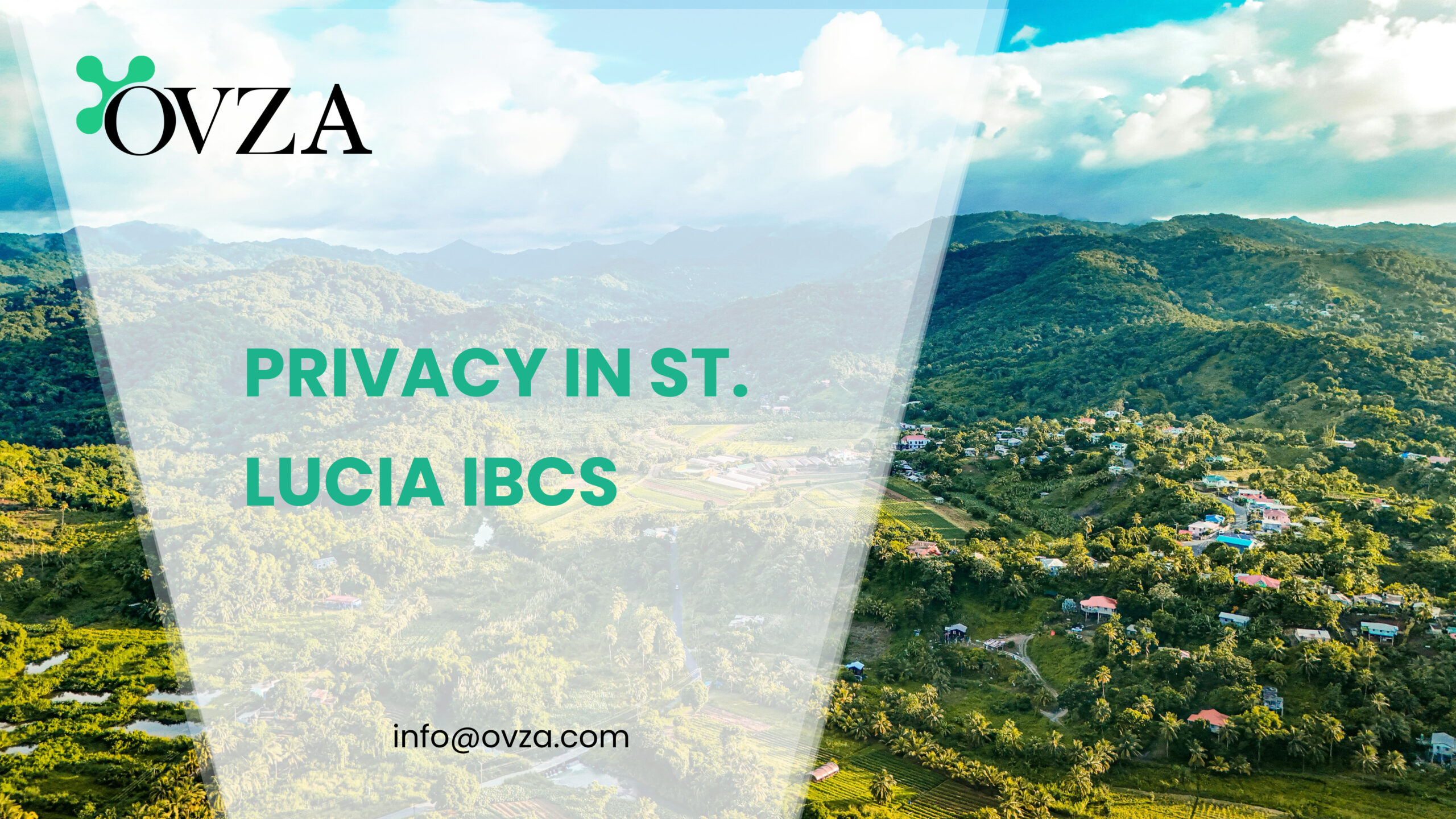Privacy in St. Lucia IBCs protects ownership data while complying with international tax and AML disclosure laws. Privacy in St. Lucia IBCs is a critical feature of the jurisdiction’s offshore legislative regime, carefully balanced between the legitimate interests of confidentiality in commercial affairs and the international obligations of transparency and regulatory compliance. The International Business Companies Act, Cap. 12.14 of the Revised Laws of Saint Lucia, establishes a framework in which beneficial owners, shareholders, and directors of an IBC are shielded from public disclosure, subject to well-defined exceptions under international law.
Legal Safeguards and International Boundaries
The Registrar of Companies in St. Lucia does not maintain a publicly accessible database of shareholders or beneficial owners of International Business Companies. This confidentiality framework provides a distinct advantage for investors seeking jurisdictional privacy, especially in an era where many comparable jurisdictions have transitioned to public registers in response to pressure from the OECD and the EU Code of Conduct Group on Business Taxation. This policy choice makes privacy in St. Lucia IBCs a legally significant factor when structuring offshore entities for asset protection, investment holding, or corporate planning.
Nevertheless, privacy in this context is not absolute. The Financial Intelligence Authority (FIA) of Saint Lucia operates under the Money Laundering (Prevention) Act, which mandates disclosure of beneficial ownership information to competent authorities upon request. Under the international framework of the Financial Action Task Force (FATF) Recommendations, Saint Lucia is required to maintain mechanisms for competent authorities to access beneficial ownership data in a timely manner. These obligations are incorporated into local law through due diligence and record-keeping duties imposed on Registered Agents under Section 97 of the IBC Act.
In practice, privacy in St. Lucia IBCs is preserved through the division of regulatory access and public access. The law requires Registered Agents to collect and maintain beneficial ownership data, but it restricts this information from being published or distributed outside of formal inquiries. This model complies with the OECD’s Global Forum on Transparency and Exchange of Information for Tax Purposes without compromising the private nature of IBC ownership structures for lawful purposes. It also reflects the core distinction between transparency for regulatory enforcement and public availability of corporate records.
From a comparative standpoint, St. Lucia’s approach is aligned with jurisdictions such as Nevis and the Cook Islands, which also maintain private registers accessible only to domestic authorities or treaty partners. In contrast, jurisdictions like the United Kingdom and the Cayman Islands have opted for publicly searchable UBO registers or have committed to implementing them in accordance with evolving EU and FATF expectations. This divergence underscores why privacy in St. Lucia IBCs remains attractive for clients seeking lawful confidentiality within an OECD-compliant framework.
St. Lucia IBCs are also insulated from unnecessary exposure through their limited filing obligations. Annual returns and financial statements are not required to be filed with the Registrar unless the company is engaged in regulated activity or elects to operate as a tax-resident company domestically. This further reinforces the jurisdiction’s value for international structures that prioritize discretion while maintaining legal compliance. The balance between operational flexibility and legal opacity remains one of the primary drivers for selecting St. Lucia as a base for offshore company formation.
Limitations, Disclosure Obligations, and International Cooperation
Although privacy in St. Lucia IBCs is legislatively protected, it exists within a legal system that integrates international norms relating to anti-money laundering, tax evasion prevention, and cross-border cooperation. The IBC Act mandates that every International Business Company must appoint a licensed Registered Agent in St. Lucia, who is legally obligated to conduct know-your-client (KYC) checks and to maintain records of beneficial ownership. While these records are not filed with the public registry, they must be made available upon lawful request by the Financial Intelligence Authority or the Inland Revenue Department.
St. Lucia is a signatory to multiple tax information exchange agreements (TIEAs) and participates in the OECD’s Multilateral Convention on Mutual Administrative Assistance in Tax Matters. These instruments require the jurisdiction to respond to specific and justified requests for tax information, including beneficial ownership data of IBCs, when requested by foreign authorities. However, such exchanges must follow legal procedures and do not authorize mass or automatic disclosure to the general public.
The territorial limits of privacy in St. Lucia IBCs are also tested when these entities hold foreign assets, operate bank accounts in third countries, or serve as parent companies in multinational groups. In such contexts, foreign regulators and banks may request UBO data or enhanced due diligence under local AML laws. Financial institutions are often compelled to comply with FATCA or CRS disclosure regimes, and may request information beyond what is disclosed to the St. Lucian government. This means that while St. Lucia’s domestic legal framework protects company data from general publication, real-world operations may still trigger extraterritorial scrutiny.
Furthermore, although St. Lucia has not implemented a public central register of beneficial ownership, this policy is subject to future change depending on ongoing evaluations by the Global Forum on Transparency and Exchange of Information for Tax Purposes. Jurisdictions that fail to align with international benchmarks may face reputational damage or economic sanctions, including inclusion on the EU list of non-cooperative jurisdictions.
Nonetheless, privacy in St. Lucia IBCs remains superior to that in jurisdictions that have adopted automatic or public UBO registers. The current framework reflects a dual commitment: to protect the legal confidentiality of private commercial arrangements, while also ensuring that the jurisdiction meets its obligations under international law. The legal infrastructure is designed to ensure that the identity of beneficial owners is available to regulators when needed, but not subject to general public search or misuse by third parties.
The balance struck by St. Lucia‘s legislation allows IBC owners to structure holdings, manage investments, or consolidate assets through a legal entity that is both discreet and compliant. This makes St. Lucia a compelling option for foreign nationals and non-resident investors who require legal privacy without sacrificing access to international financial services.
Final Reflections: Strategic Use and Legal Boundaries
The integrity of privacy in St. Lucia IBCs is reinforced by the country’s legislative decision not to maintain a public register of shareholders or beneficial owners, and by the legal duty of registered agents to safeguard client data. This privacy framework offers a lawful shield for individuals and corporate actors seeking to separate personal identity from commercial activities, protect family wealth, or maintain strategic confidentiality in cross-border transactions.
However, this privacy is not absolute. It is legally constrained by the requirement to comply with requests from competent authorities under domestic law or international treaties. Registered agents must maintain updated records of beneficial ownership and directors, and provide access to such information upon lawful demand. These legal provisions ensure that privacy in St. Lucia IBCs does not compromise the jurisdiction’s obligations under the FATF’s transparency standards or its commitments to international tax cooperation.
In legal and practical terms, privacy protections in St. Lucia are effective so long as the IBC operates within the confines of lawful activity, maintains proper records, and avoids triggering red flags in foreign regulatory or financial environments. The jurisdiction’s ability to preserve this privacy framework will depend on continued compliance with international expectations while resisting external pressure for unnecessary disclosure. The current regime succeeds in providing protective legal infrastructure for confidentiality without offering impunity for illegitimate conduct.
St. Lucia’s approach stands in contrast to jurisdictions that have implemented public registers in response to international pressure, often without considering the legal and reputational risks to legitimate private enterprise. The preservation of privacy in offshore regimes will increasingly hinge on a jurisdiction’s ability to defend its domestic legal frameworks while demonstrating functional transparency for regulatory cooperation.
Conclusion
Privacy in St. Lucia IBCs remains one of the most robust yet compliant frameworks available in the offshore sector today. The jurisdiction allows for legitimate confidentiality in corporate ownership, while ensuring that relevant authorities can access necessary information in accordance with due process and treaty obligations. For legal practitioners, investors, and fiduciaries, St. Lucia offers a favorable environment to establish entities that combine legal security, operational discretion, and international acceptance.
As regulatory regimes evolve globally, the continued viability of privacy in offshore companies will require precise legal drafting, vigilant compliance, and jurisdictional selection based on both current law and the direction of international policy. Within that matrix, St. Lucia IBCs continue to serve as a lawful and effective tool for private international business structuring.
Disclaimer: The information provided on this website is intended for general reference and educational purposes only. While OVZA makes every effort to ensure accuracy and timeliness, the content should not be considered legal, financial, or tax advice.












